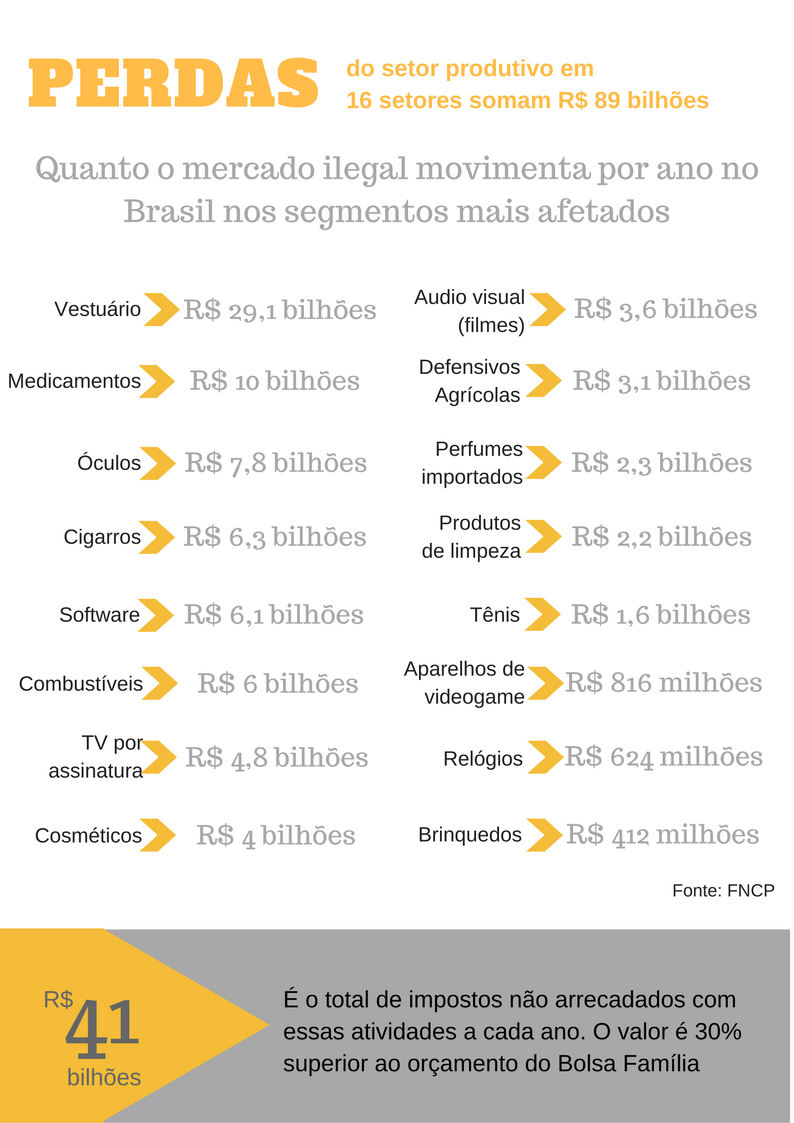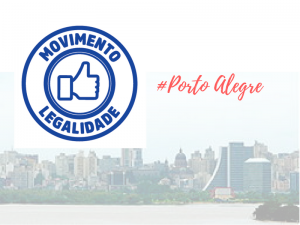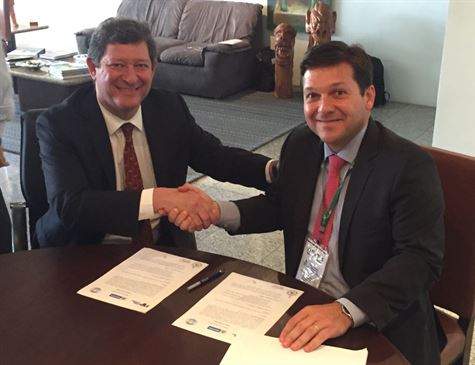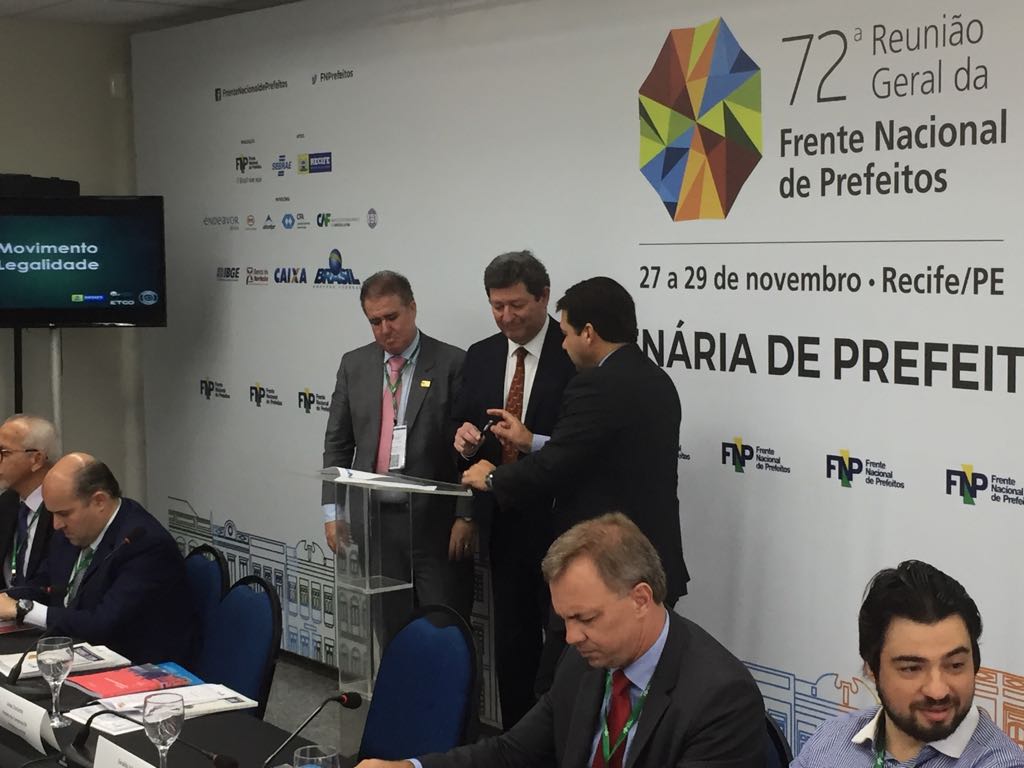Initiative unites municipal, state and federal agencies and has the participation of ETCO and other entities that fight against smuggling, piracy and counterfeiting of products
Smuggling, piracy and other forms of illegal trade harm companies that operate legally, destroy jobs, finance criminal organizations, take products with no quality control to citizens and reduce government tax collections, harming public services.
Despite so many evils, the fight against these crimes is not usually as rigorous as it should be - neither at the borders, where gangs move large amounts of cargo clandestinely, nor in the areas of popular commerce in large cities, where the sale of pirated products and smuggled goods usually happen in the open.
In the main capital of the country, however, the history of leniency may have its days numbered. The city of São Paulo decided to join forces with the Movement for the Defense of the Brazilian Legal Market, which has the support of 70 entities and is coordinated by ETCO and the National Forum Against Piracy and Illegality (FNCP), in the creation of the Legality Movement with the objective of intensifying the fight against smuggling in the capital.
The initiative consists of coordinated actions to combat illegal trade involving the inspection bodies of the City Hall and also the State (Civil and Military police, Sanitary Surveillance, Procon and Ipem) and the Union (Federal Revenue, Federal Police, Anvisa and ANP).
Based on the pioneering experience of the city of São Paulo, the project, which already has the support of the National Front of Mayors, will be implemented in other municipalities in the coming months. Porto Alegre and Campinas have already joined.
ETCO's president, Edson Vismona, believes that the decision of the São Paulo City Hall to adopt the project will have important effects on the reduction of illegal trade in the city and should become a reference for the rest of the country. According to him, in recent years, the municipality has come adopting a permissive attitude towards the sale of pirated or smuggled products to both end consumers and resellers. “São Paulo is an important distribution center for illegal products throughout Brazil,” he says. "Legal market defense entities have long claimed a more forceful attitude on the part of the public administration - and now it has come."
THE SIZE OF THE PROBLEM
Smuggling, piracy and counterfeiting of products produce huge losses for manufacturers and traders who respect the laws and public coffers. According to a survey carried out by the FNCP, last year, in the city of São Paulo alone, these crimes generated more than R $ 9 billion in losses for 16 productive sectors - among the most affected are software, audiovisual, tobacco, clothing, fuels, medicines and cosmetics. The activity caused R $ 4,5 billion in tax evasion, money equivalent to two years of budget in municipal daycare centers and enough to maintain the program of free distribution of medicines to the population of São Paulo for 15 years.
One of the main smuggled products is cigarettes: currently, 35% of the entire market in the capital is dominated by illegal brands, mainly of Paraguayan origin. In 2016, 5 billion units of illegal cigarettes were sold.
The ETCO president notes that financial damage is only part of the problem. He recalls that products that arrive on the market in a clandestine manner do not pass the inspection filters that protect the health of the population. And he points out that the illegal consumer goods market fuels organized crime and finances drug and arms trafficking, increasing the rates of violence.
“We are going to work together with the City Hall to combat these evils that so many losses bring to our city,” said Vismona at the launching ceremony of the Legality Movement, on September 15th. “The violence that is on the streets and that scares us is financed by these crimes. To fight against this is to fight for the life and dignity of the people of São Paulo. The Municipality of São Paulo is taking the lead, but the time has come to join forces with all Brazilian municipalities in search of solutions for the illegal market. ”

NOW THE LAW WILL BE FULFILLED
On the occasion, the mayor of São Paulo, João Doria, thanked the partnership with ETCO and the Brazilian Legal Market Partnership Movement and promised to act strictly. "The time for leniency is over," said Doria, who criticized the demagogic discourse of justifying tolerance with sellers of smuggled products for considering them victims of unemployment (read on page XX). "From now on, in the city of São Paulo the law will be enforced."
Federal Deputy Efraim Filho (DEM-PB), president of the Parliamentary Front to Combat Smuggling, praised the adhesion of the São Paulo City Hall to the project. According to him, the great challenge to fight against the illegal market is not to change or create new laws. "Changing the law is perhaps the easiest part - the cold letter of the law on a page of paper," he said. “Our great challenge is to change the culture, because the culture of tolerance that exists with these small crimes ends up putting us in an absolutely paradoxical situation, especially in Brazil today, where we all know what is right, but we must have courage to do right, as São Paulo is doing. ”








 O Brazilian Institute of Competitive Ethics (ETCO) and the National Forum Against Piracy and Illegality (FNCP), in partnership with Porto Alegre City Hall and National Mayors Front, launch on the day on December 18, Monday, at 10 am, at the Porto Alegre City Hall, the Legality Movement.
O Brazilian Institute of Competitive Ethics (ETCO) and the National Forum Against Piracy and Illegality (FNCP), in partnership with Porto Alegre City Hall and National Mayors Front, launch on the day on December 18, Monday, at 10 am, at the Porto Alegre City Hall, the Legality Movement.






